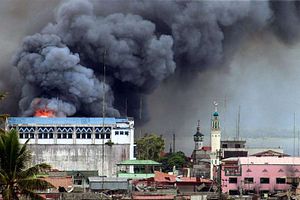Last Friday, a twin suicide bombing killed eight people outside a military camp in the southern Philippines. While some specifics still remain unclear, the attack has nonetheless heightened fears about the prospect of suicide bombings becoming a new normal in terrorist attacks in the Philippines amid growing radicalization by the Islamic State (IS).
Terror attacks themselves are not new to the Philippines. Indeed, within Southeast Asia, the southern Philippines has long been viewed as a hotbed for militant activity. This was where the IS threat manifested itself most clearly in the region, with the five-month siege in the southern city of Marawi in 2017 being a case in point.
But the use of suicide bombings in recent attacks over the past year in particular sparked new fears that the tactic may be a new normal in the Philippines. An attack in Basilan last August, where a van was driven through a checkpoint, and one at a church in Jolo in January, had already led to speculation that this could be the case as Islamic State-linked militants adjust their tactics following their defeat at Marawi.
Last week, a new attack further heightened these fears when a twin suicide bombing killed eight people outside a military camp in Sulu. IS has claimed responsibility for the attack, and it was believed to be carried out by a group led by Hatib Hajan Sawadjaan, who is said to be effectively leading the IS branch in the Philippines after the death of Isnilon Hapilon in Marawi.
The attack feeds into the narrative of suicide bombing becoming more common in the Philippines. With the attack, the Philippines has now experienced three suicide bombing attacks in less than a year. Philippine officials also said this is the first instance where a suicide bombing featured locals, suggesting a greater use of this technique and more evidence of foreign indoctrination. Speaking to the significance of the attack, Philippine Defense Secretary Delfin Lorenzana told local reporters that it constituted a “very important development.”
More broadly, the attack is further proof that IS-linked militants still continue to pose a threat in the Philippines despite the government’s best efforts, including domestic measures taken as well as working with neighboring states including Malaysia and Indonesia on various fronts. That this remains an issue is no surprise considering the magnitude of the problem, including underlying governance challenges and grievances that have long fueled the presence of local militant groups in the southern Philippines, which remain even as foreign influence may wax and wane over time.
To be sure, some specifics still remain unclear, and this is just a single incident within a continued contestation between militants and government forces, with various ebbs, flows, and adjustments. But given recent developments we have seen on this front, future attacks will remain important to watch to assess if suicide bombings are truly becoming more of a new normal in the Philippines.

































